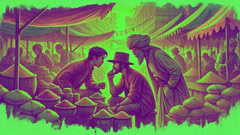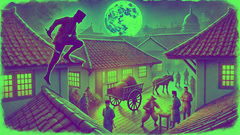Introduction
In the heart of Batavia, where the air shimmered with the promise of trade and the weight of colonial power, a legend was born in the narrow alleyways and bustling markets. The city, known today as Jakarta, was a tapestry of cultures—Betawi, Javanese, Chinese, Arab, and Dutch—each woven together by commerce and conflict. In the late nineteenth century, Batavia was a city of grand Dutch mansions shadowing bamboo huts, of opulent colonial banquets echoing in the distance from the cries of hungry children. It was a place where injustice hung thick in the humid air, and hope flickered like lanterns along the Ciliwung River at dusk.
From this vibrant yet divided world emerged Si Pitung, a name whispered with awe and gratitude in the kampungs, and with unease in the marble-floored halls of the colonial elite. To the poor and the powerless, he was a guardian—one who moved unseen across rooftops and vanished into crowds, his deeds sparking tales of hope in times of despair. To the Dutch rulers and their local cronies, he was a menace, a symbol of defiance they could not tame. Si Pitung’s story is more than an account of rebellion; it’s a chronicle of courage, compassion, and the struggle for justice under the weight of oppression.
Born to humble parents in Rawa Belong, a village just beyond the city’s reach, Pitung’s early life was marked by simplicity and hardship. His father, Pak Cangak, a devout farmer, taught him the values of honesty and perseverance, while his mother, Mak Pinah, instilled in him kindness and respect for all. Pitung grew up among the swaying coconut palms, playing with friends along muddy riverbanks, never imagining that his destiny would entwine with the fate of a city. Yet, as Batavia’s inequalities deepened—taxes tightened, markets rigged, and lives weighed down by foreign rule—Pitung’s sense of justice awakened. Guided by faith and sharpened by the teachings of local martial arts masters, he learned to fight not for glory, but for those whom society overlooked.
This is the story of Si Pitung—the boy who became Batavia’s champion, the outlaw with a heart of gold, the legend who proved that one person’s courage could ignite a flame in the darkness.
Humble Beginnings in Rawa Belong
Si Pitung was born as Salihoen, though few would remember his birth name in the years that followed. The village of Rawa Belong, west of the crowded heart of Batavia, was a place of muddy footpaths, sprawling rice paddies, and laughter that rang out even in the leanest seasons. Life was not easy, but it thrived on community—a shared bowl of rice, a helping hand in the fields, a song to drown out hardship. Pitung’s family was known for their honesty. Pak Cangak, his father, was a man of prayer and purpose, respected for the way he treated neighbors with fairness. Mak Pinah, his mother, filled their home with warmth, telling stories as she worked, her voice rising above the rhythm of the pestle and mortar. Young Pitung would listen, eyes wide, to tales of heroes and tricksters, the mighty and the merciful.

When Pitung was seven, a year of bad floods swept away much of the harvest. The Dutch tax collectors arrived with their ledgers, indifferent to loss. They demanded their due with cold efficiency, and when the villagers could not pay, they took livestock and tools instead. Pitung watched as his father tried to reason with the collectors—only to be shoved aside, his pleas lost beneath foreign tongues. That night, as rain hammered the thatched roof, Pitung made a silent vow: one day, he would stand up for those who could not defend themselves.
Schooling was a rare privilege in Rawa Belong, but Pitung was a quick learner. He helped his father in the fields by dawn, then practiced silat—the traditional Betawi martial art—at dusk under the tutelage of Haji Naipin, a wise and wiry master with a fierce loyalty to his people. Silat was more than movement; it was discipline, humility, and balance. "You must become water," Haji Naipin would say, guiding Pitung through stances and strikes. "Flow around obstacles. Strike only when you must. And never forget who you fight for."
By his teenage years, Pitung’s reputation began to grow. He could outrun anyone in the village and was said to catch chickens blindfolded—a skill that earned laughter at the market but respect in training. He helped neighbors in need, mended fences, fetched water, and shared whatever his family could spare. Yet beneath the surface, Batavia’s tensions simmered. The city’s wealth rarely trickled out to the kampungs. Dutch officials and local collaborators imposed crushing taxes, forcing many into debt or servitude. One evening, word spread that a poor widow’s land was being seized. Pitung saw her weeping by the river, clutching her children. Something in him shifted. He knew the time had come to act.
His first act of defiance was small but daring. Under cover of darkness, he slipped into the Dutch merchant’s storehouse where the widow’s harvested rice had been taken as collateral. Quiet as a cat, he retrieved two sacks—enough to feed her family for a month. The next morning, the widow found the rice at her doorstep, a single betel leaf placed atop as a sign. Rumors spread: a mysterious helper prowled Batavia’s nights. Pitung had discovered his calling—not for revenge, but for restoration. He moved carefully, always returning what he took to those in need. The village whispered his name with pride and hope. With each daring deed, Si Pitung’s legend took root in the fertile ground of hardship and resilience.
A Rising Hero in Colonial Batavia
As Si Pitung grew into manhood, Batavia’s landscape shifted around him. The city’s heart pulsed with activity: traders shouted beneath canvas awnings, rickshaw drivers jostled for fares, and Dutch soldiers marched through cobblestone streets with an air of detached authority. But in the shadows of progress, the poor grew poorer. The gap between the privileged and the powerless widened with every new tax and regulation.

Pitung found work as a porter at the bustling Tanah Abang market, hauling sacks of rice, spices, and textiles for a handful of coins each day. He learned to read the faces of merchants—who would cheat a customer, who would slip an extra handful of chilies to a hungry child. His sense of justice sharpened as he witnessed women bargaining for scraps and laborers punished for speaking out. The Dutch overseers were quick with their whips, slow with their mercy. Yet Pitung never lost his sense of humor or compassion; he was the first to intervene in a quarrel and the last to eat when food was scarce.
It was at Tanah Abang that Pitung encountered two men who would become his closest companions: Rais, a wiry street performer with nimble fingers and an even quicker wit, and Jampang, a burly ojek driver whose booming laugh could scatter a flock of crows. Together, they formed an unlikely brotherhood—united by their struggles, skills, and sense of injustice. Over steaming bowls of soto Betawi, they shared stories of hardship and devised ways to help their neighbors. When a merchant cheated the orphaned twins who sold peanuts, Rais would distract the crowd with card tricks while Pitung quietly returned their lost earnings. When a foreman threatened to evict an elderly couple for missed payments, Jampang stood guard as Pitung brokered a deal with sympathetic locals. Their actions grew bolder: sabotaging Dutch warehouses, redistributing confiscated goods, and outsmarting the colonial police with elaborate disguises.
Pitung’s fame spread beyond Rawa Belong to the labyrinthine alleys of Kota Tua and the grand avenues of Menteng. He became a figure of hope for the oppressed—a phantom who slipped through patrols, a legend who left no trace but his good deeds. Children sang songs about him as they played by the river, and mothers told bedtime stories of his cleverness. But not all welcomed his rising star. Dutch authorities, stung by rumors of stolen valuables and liberated prisoners, launched manhunts. Posters bearing crude sketches of Pitung’s face appeared on city walls. The colonial police chief, Major Kommer, vowed to capture this “bandit” and restore order.
Despite the danger, Pitung’s resolve deepened. He trained with silat masters in secret courtyards, learning to harness his agility and inner strength. He prayed at dawn in the shadow of old mosques, seeking wisdom and courage. Each new act of justice brought greater risks—but also greater rewards. Pitung realized that he was not just stealing from the rich; he was reclaiming dignity for the powerless. Through him, Batavia’s forgotten people found their voice. And as the legend of Si Pitung grew, so did the hope that justice might one day prevail.
The Duel of Wits: Outfoxing the Oppressors
Major Kommer was no ordinary adversary. The Dutch police chief prided himself on discipline and order, and he could not abide being made a fool by a kampung youth. He tightened patrols across Batavia, offering rewards for information and arresting anyone suspected of aiding Pitung. Yet for every snare set, Pitung seemed to slip through another crack. His network of informants—street vendors, rickshaw drivers, market children—kept him one step ahead. The city hummed with rumors: Pitung had magical powers, could vanish at will, or even turn bullets to dust with prayers.

The truth was more remarkable than myth. Pitung’s greatest weapons were his quick mind and unwavering purpose. He studied Dutch routines, mapped secret routes through the city, and used disguises so convincing that even his friends sometimes failed to recognize him. Dressed as a beggar, he listened at the doors of colonial officials; as a spice merchant, he infiltrated guarded warehouses. Rais’s sleight of hand and Jampang’s imposing presence helped at every turn. Together, they orchestrated daring heists—liberating sacks of rice from warehouses destined for export, redistributing stolen jewelry to pay off villagers’ debts, and even freeing unjustly imprisoned laborers from the city jail.
Kommer grew increasingly frustrated. He set elaborate traps: double agents, staged convoys, rumors of gold shipments. Each time, Pitung responded with cunning. Once, he sent Rais dressed as a Dutch official to deliver a forged letter, causing confusion and buying time for a rescue mission. Another night, Jampang led a noisy procession through a busy street while Pitung slipped undetected into a magistrate’s mansion to retrieve confiscated property. Their operations were precise but never cruel; Pitung forbade violence except in defense. His code set him apart from common bandits and earned him the trust of the people.
Yet, the stakes grew higher. Kommer, humiliated by failure, targeted Pitung’s family and friends. Homes were raided, crops trampled, neighbors interrogated. Pitung felt the cost of heroism—the weight of every risk taken on behalf of others. But he would not be broken. He sought solace in prayer, trusting that his cause was righteous. In moments of doubt, Mak Pinah reminded him: "True strength is not in fists or fame, but in the heart that endures."
One night, as a full moon rose over Batavia, Kommer laid his boldest trap yet—a heavily guarded convoy rumored to carry tax gold. Pitung and his friends studied the convoy’s route for days. On the night of the heist, Rais created a distraction by staging a street performance that drew hundreds. Jampang used his strength to move obstacles into the convoy’s path. Pitung, cloaked in shadows, crept along the rooftops and dropped silently into the convoy’s midst. He unlocked a chest meant for colonial coffers and replaced its contents with rocks, leaving the gold in a safe house for redistribution. By dawn, the city buzzed with news: Kommer’s convoy had been duped. Pitung’s legend soared.
In the dance between hunter and hunted, Si Pitung’s wit shone brighter than any weapon. He proved that even against overwhelming odds, the heart and mind could shape the fate of a city.
Conclusion
The legend of Si Pitung endures far beyond the walls of colonial Batavia. Though the real man behind the myth may have lived only a few short years—some say he was captured and killed by Major Kommer’s men in a final showdown—his spirit lives on wherever justice is threatened by greed and oppression. In Jakarta’s modern neighborhoods, children still play at being Pitung, leaping over drains and darting through alleys in search of adventure. The old kampungs remember him not as an outlaw, but as a symbol of hope—a man who gave voice to the voiceless and stood unflinching before power.
Pitung’s greatest victory was not in gold stolen or soldiers outwitted, but in the courage he inspired among ordinary people. He proved that compassion could be a weapon, that dignity could be reclaimed even in the darkest times. His story weaves through Jakarta’s history like the Ciliwung River—sometimes hidden, always moving. In every retelling, Si Pitung reminds us: justice is not given; it is forged in the hearts of those brave enough to challenge injustice, and kind enough to share what they have.













